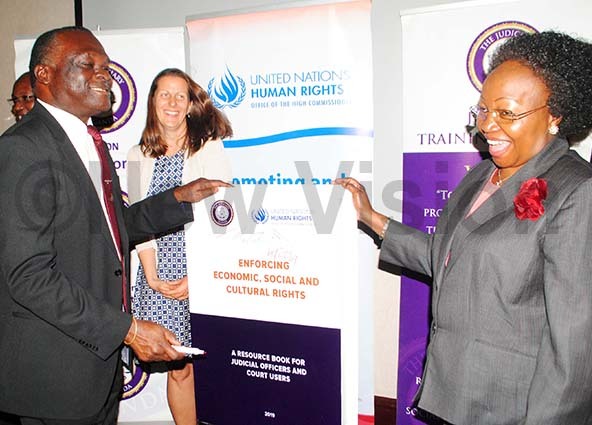Judiciary develops manual on human rights adjudication
The manual will help in pursuing effective accountability, regulation, remedies, and implementation through participatory approaches like promoting public debates and intensifying cross-network strategies for investigation.
JUDICIARY
KAMPALA - The judiciary has developed a human rights manual to assist in securing justice for systemic Economic, Social and Cultural Rights (ESCR) violations.
The manual will help in pursuing effective accountability, regulation, remedies, and implementation through participatory approaches like promoting public debates and intensifying cross-network strategies for investigation.
The Deputy Chief Justice Alfonse Owinyi-Dollo said, on many occasions, several groups could not realize the required justice due to the luck of a common guiding tool to the judicial officers.
"Many times, judicial officers have failed to settle cases with issues of human rights elements ending up with weak remedies which is unfair to the affected persons," he said.
Owinyi-Dollo while launching the manual, he noted that the book will offer guidance to judicial officers in the course of adjudicating cases which have bearing to issues of economic, social and cultural rights with the appropriate information and lens.
"This book will hold the government accountable for the violations and also to mobilize collective efforts to develop communities and global frameworks conducive to economic justice, social wellbeing, participation, and equality," he explained.
He added that the manual is intended to reinforce the credibility and capacity of human rights defenders of the grassroots groups, social movements, academic centers, the private sector and the courts for judicature.
Owinyi-Dollo further explained that the ESCR is an important tool that helps to unite women and men, migrants and indigenous people, youth and elders of all races to realize universal human freedom and dignity.
Judicial Training Institute (JTI) executive director Henry Adonyo said the resource book also provides a comparative litigation experience as well as key techniques for meaningful engagement with courts on remedies for ESCR violations.
"It highlights the place of ESCR in International human rights law, the developments regarding ESCR at the Africa level, the legislative approaches in Uganda and comparative Africa jurisdictions, in addition to adequately mentioning all the available remedies," he said.
Nicole Bjerler, Deputy Representative of the Office of the UN High Commissioner for Human Rights (OHCHR) said judicial officers play a key role in the fight for a just and equitable society.
"Through the adjudication of cases, you seek to establish such conditions that address inequalities and discrimination, remedy injustices and allow people to fulfill their full potential," Bjerler said.
She noted that the Economic, Social and Cultural rights are strongly anchored in the 2030 Agenda for Sustainable Development adopted by the UN Member States in 2015.
"For peaceful and inclusive societies, we need justice, effectiveness, transparency, accountability and participation principles that institutions should follow to deliver the 2030 Agenda, to realize all human rights and to strengthen the trust on which social cohesion is built," she explained.
 Deputy Chief Justice Alfonse Owiny Dolo and Judge of Supreme Court Justice Stella Arach Amoko launching the Judicial Resource Book on the enforcement of economic social and cultural rights on July 18, 2019.photo by Mary Kansiime
Deputy Chief Justice Alfonse Owiny Dolo and Judge of Supreme Court Justice Stella Arach Amoko launching the Judicial Resource Book on the enforcement of economic social and cultural rights on July 18, 2019.photo by Mary Kansiime
Bjerler noted that there is increasing evidence that violations of economic, social and cultural rights are causes, consequences and often even predictors of violence, social unrest, and conflict.
She added that these occur in countries with varying levels of development, political and governance systems, and demographics of the population.
"Understanding the linkage between ESCR and conflict can help us in identifying and addressing early signs of social discontent, extremism, and violence, and ensure peace and development. The Judiciary has a crucial role in ensuring social peace," she said.
She stressed that OHCHR remains committed to supporting Uganda in its commitments to the realization of economic, social and cultural rights.
"We will continue supporting relevant national institutions and civil society organizations in their important work towards ensuring the promotion and protection of the human rights of all persons in Uganda," she said.